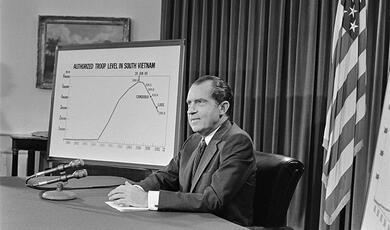Olympism: Fair Play
Share
- Details
- Text
- Audio
- Downloads
- Extra Reading
Fair Play is at the heart of sports ethics, and of Olympic ethics. But what does it mean, and how does it work?
Other lectures in this series are as follows:
Ethics and Politics - 1 February 2011
Education - 15 February 2011
Download Text
29 February 2012
Olympism:
Fair Play
Dr Jim Parry
Let us remind ourselves briefly of the results of the previous lectures:
Olympism is about not just the elite athlete, but everyone; not just a short truce period, but the whole of life; not just competition and winning, but also the values of participation and co-operation; not just sport as an activity, but also as a formative and developmental influence.
It sees itself as a universal social philosophy which emphasises the role of sport in world development, international understanding, peaceful co-existence, and social and moral education. And the philosophical anthropology of Olympism promotes the ideals of individual all round harmonious development; towards excellence and achievement; through effort in competitive sporting activity; under conditions of mutual respect, fairness, justice and equality; with a view to creating lasting personal human relationships of friendship; international relationships of peace, toleration and mutual understanding; and cultural alliances with the arts.
We also noticed that certain salient features of competitive sport carry with them evaluative import. If we ‘define’ sport as mutually committed, rule-governed and institutionalized physical contests, it is hard to evade an attachment to effort, excellence, rule adherence and fairness, lawful authority and respect for co-operating competitors.
So, it's not just competitive sport - but ethical competitive sport – with which Olympism is concerned, and this is what produces personal and social goods, and what enables the potential of ethical sport as an educative influence. So we need to look again at the ethical basis of sport – participating and competing not for material gain, but for intrinsic values and satisfactions. (This is, after all, what 98% of sports participation is about – elite professional sport being a very small fraction of sports participation.)
Fair Play as a Logical Requirement, and the Contract to Contest
Fair Play is usually thought of as a virtue of rule-adherence, or as a ‘spirit of sport’ leading to super-erogatory actions. Sometimes a grander view is proposed, such as fair play as a general attitude towards sport (and even life itself) involving respect for others, modesty in victory, serenity in defeat and generosity towards others. Finally, many see fair play as a behavioural ideal for moral education.
It often goes unnoticed, however, that the primary nature of fair play in sport is not as a moral requirement, or an educational tool, but as a logically necessary feature of successful engagement in the contest Such an account may begin to indicate the logico-moral basis of sport, and thus suggest arguments that may be raised against cheating or other rule-breaking. For we may ask how cheating relates to the practice of sport; and whether one can have a successful sports practice in which cheating regularly occurs. Obviously, the answer depends on the kind and level of cheating involved – but the primary wrong in (say) doping or unlawful violence lies in simple rule-breaking.
The rules function as a kind of pre-competition agreement which specifies an athlete’s eligibility to compete and his rights, duties and responsibilities under the agreed rules. What’s wrong with doping is the secretive attempt to evade or subvert such a ‘contract to contest’, an explicit example of which is the Olympic Oath, by which athletes swear that they have prepared themselves ethically, and will keep to the rules.
To freely choose to be accepted into a community of practice entails an obligation to duly respect the rules of the practice (or institution) as its lawful authority. To subvert such a contract to contest threatens the moral basis of sport, jeopardises the integrity of the sporting community and erodes public support and trust. I suggest that we can’t have sport without fair play. Now let us consider some examples.
Ethical issues – example 1: Why public panics about sports doping? As suggested above, it is not because it's harmful, or unnatural, or enhances performance, or allows athletes to train harder, or coerces others to use them, or is illegal; but rather because it threatens the ethical basis of sport. It abrogates the pre-competition agreement - the contract to contest - without which we can't have sport. (For a topical illustration, with a judgement to be decided within the fortnight, see the Appendix, below.)
The sportsdope problem has been medicalised - thus ensuring that it won't be solved. The problem should be ethicised. The OG is precisely the kind of motivation we need to ethicise the problems of sport, so that they can be oriented towards educational solutions.
Ethical issues –example 2: Jacques Rogge has called gambling the greatest threat to modern sport. (Gambling is the new doping!) The scandal of the non-prosecution of Matt Le Tissier, who publicly admitted to attempted ‘spot-fixing’ while playing for Southampton. There is a two-fold wrong here: gambling-fraud and sportsfraud. The first is a criminal offence, whereas the second (which ought to be, on the ground that it defrauds others of the benefits of victory, reneges on the contract to contest, and (again) threatens the very existence of sport (cp cricketers banned for spot-fixing).
There is an interesting issue here regarding ‘cheating to lose’. Normally,cheating is defined as rule-breaking to gain competitive advantage, so it seems odd to call someone a cheat who is trying to lose, or lose an advantage, or at least to do something that is not designed as part of the effort to win. (For example, deliberately kicking the ball out of play so as to decide the timing of the first throw-in.) Does this count as cheating?
Do sport-actions motivated by possible betting gains count as cheating? Jacques Rogge has said: "It can be argued that there are temptations and more pressure on athletes, coaches, officials and others to cheat for betting gains than at any other time in the past. This seems paradoxical until we notice that the betting cheat is not cheating at football. He is simply not playing football. His action is not a genuine sport-action. The advantage he seeks is not a sporting advantage, but a gambling advantage. He is therefore a gambling cheat, but not a football cheat - in the sense that he is not breaking the rules secretively for competitive advantage. (There is, of course, still the possibility that his gambling-related actions might affect the context outcome – so he might be considered reckless as to contest-harm.) The gambler-cheat allows his gambling aims to trump his sporting aims. ‘Cheating to lose’ is only possible because, in gambling, one can win one thing (the bet) by losing another (the game).
Ethical issues – example 3: This was at the root of the earlier Olympic commitment to amateurism – the idea that extrinsic goals (such as winning money) are liable to deflect us from our ethical trajectory. If we play sport in pursuit of its intrinsic goods we are less likely to stain this quest with questionable means, into which external goods (such as fame and fortune) might tempt us – because we would be besmirching the very thing that we have chosen to do. But this is not just a sporting problem – rather a problem throughout life. True, athletes might be corrupted into doping and diving and fouling in their desperate attempts to win prizes; but businessmen, too, might be tempted away from ethical business practice and into corrupt means to maximise their profits or save their businesses.
Ethical issues – example 4: Violence.But surely trying to win in serious competitive sport requires aggression and seeing the other as an opponent, an enemy – thus encouraging violence? The above fails to distinguish between aggression and violence. Aggression means taking forceful means to your ends; whilst violence means intending to harm. So: you can be as aggressive as you like, but so long as you do not intend or risk harm, that’s not being violent. And the rules of team games reflect this distinction: tootball and rugby permit any level of aggression, unless and until it threatens to harm, and then it’s illegal.
I find it an attractive and intriguing idea, worthy of further consideration, that the competitive sports situation challenges individuals to develop and use their power and aggressiveness; but not, finally, to use this power to violate and subjugate the other. May we see more assertive and aggressive people, and less violent ones. And may sport be an agent of moral change.
Ethical issues – example 5: Deception and Cheating. One major problem for a principled approach to games-playing lies in the area of cheating and rule-infraction. Cheating involves ‘breaking a rule with the intention to deceive’, which can be compared with the immoral practice of lying, which involves not just telling untruths; but telling untruths with the intention to deceive. However, in sport, ‘the intention to deceive’ is not necessarily seen as wrong, but is even regarded as good strategy (selling a dummy, feinting, disguising a shot, executing a ‘deceptive’ change of pace, etc.). The question has been raised: how can we see sport as morally educative when we’re encouraging players to deceive?
We must distinguish between two different kinds of deception: strategic deception, (which is within the rules, and requires mastery of skills that are constitutive of the sport, and definitional deception (which is going against the rules that define the sport). Again we see that we must appeal to the moral basis of sport in order to see things more clearly. Fair play outlaws deceptions which are against the rules, but allows deceptions that are within the rules. There is nothing paradoxical about that.
Conclusion: These examples show that it is Fair Play, seen as the internal logic of sport, that provides the rationale for distinguishing good from bad practice - permissible from impermissible actions – and that Fair Play, the basis of the logic of sport, is also the foundation-stone of the ethics of sport.
Appendix: The BOA vs WADA – drug cheats competing at the Olympics?
On March 12 2012, at a private hearing, the Court of Arbitration for Sport will consider the British Olympic Association's defence of its anti-doping byelaw that imposes a lifetime ban on athletes convicted of drugs offences. This case came about because a World Anti-Doping Agency panel (led by Canadian barrister Richard McLaren, and also including the Swiss Michele Bernasconi and American David Rivkin), considering the case of LaShawn Merritt, overturned the International Olympic Committee ruling preventing athletes banned for more than six months from competing in the next Games. This led to the WADA request for the BOA to rescind its byelaw, as non-compliant with the new ruling, and the BOA has declined.
The BOA wishes to keep in place its lifetime ban for serious doping offences, which at present excludes athletes such as Dwain Chambers and David Millar from competing in the Olympic Games. If this ban is overturned, the BOA might have to include such athletes in Team GB for London 2012.
Questions and Issues
Often, our moral or philosophical interest is aroused by some particular issue or another. However, our responses to particular issues are sometimes shaped by more general ideas, or positions that we hold.
The particular issue, which must soon be resolved one way or another (for London 2012, at least) is: should those convicted of serious doping offences ever be allowed to compete again at the Olympics (or at all)?
We all have immediate responses to issues such as this - but they are not always our best effort. Sometimes we have contradictory or inconsistent intuitions. I find myself thinking both that drugs cheats have disqualified themselves forever by their unfairness to others, and also that there is an unfairness in 'forever', which does not allow an offender to serve his time and pay his dues. Which intuition do I go with? Maybe I will simply remain confused!
Philosophy tries to disentangle our inconsistent and confused thoughts about such issues, and it challenges us to hear and consider reasons that we had not thought of ourselves. It asks us to think - and think again.
So should these cheats be banned forever, or should they be allowed to compete? Whatever your answer, you will need to back it up with reasons and well-considered arguments. Of course, you can always keep your private 'opinions' to yourself. But you only earn the right to enter the public discussion on the basis of the quality of your thinking. We are interested not so much in your opinions, but in your considered judgements,backed by reasons and arguments.
Here is a version of the BOA case:
1. The BOA says that its policy protects the interests of 'clean' athletes, 90% of whom consistently vote in favour of its selection policies (including the policy of not selecting those convicted of serious doping offences).
2. The BOA says that, since its byelaw was introduced in 1992, it pre-dates WADA and its Code.
3. The BOA says that, if the byelaw is rescinded, the selection of athletes who have been convicted of serious doping offences would damage team morale, atmosphere and cohesion.
4. The BOA says that the IOC has recently reaffirmed, in writing to the BOA, that it is entirely within the remit of every NOC to determine the eligibility standards for its Olympic team.
Of course, there will also be weighty considerations from the other side:
5. Since the IOC and WADA are global organisations, the rules must be applied consistently. It cannot it be just that LaShawn Merritt is selected for the USA team, whilst Dwain Chambers is not even considered for Team GB.
6. No system of rules should be allowed to punish twice. Chambers received a two-year ban, which he served, but then he faced a life ban from the BOA. That's unjust.
7. After taking your punishment (serving your time) that should be the end of it. You have paid your dues to society, and should be welcomed back.
8. Life bans take no account of important moral notions such as reform and redemption.
And of course (again), there are counter-considerations to both of the above positions, e.g:
9. Contra 2. - why should an earlier provision trump a later one? If such a principle held generally, how would law ever be reformed?
10. Contra 3. - the effects of a new ruling are distinct from the justice of new ruling.
11. Contra 6. and 7. - many professional organisations reserve the right to sanction a second time. (Convicted paedophiles, as well as receiving their court sentence, are struck off the register of teachers; embezzling accountants may never account again, even if they do get out of prison, etc.)
12. Contra 7. - what about 'residual benefit'? What if, after two years of a ban, an athlete returns to competition still enjoying the benefits that doping gave him?
The more general issueis: why do we think it is wrong to dope in sport at all (if we do think it's wrong)? My simple line on this has two steps to it. Step 1 says: ... because it is against the rules. Step 2 acknowledges that the rules themselves require a basis of justification, since they must appeal to some issue of principle in addition to rule adherence (such as advantage, harm, naturalness, bad example, illegality, etc). However, I would like to pause for a moment on Step 1, which I think yields two important principles requiring consideration:
1. Rule-breaking and Pre-competition Agreements
I'm saying that the primary wrong of doping lies in simple rule-breaking. The rules function as a kind of pre-competition agreement that specifies an athlete’s eligibility to compete, as well as his rights, duties and responsibilities under the agreed rules. What’s wrong with doping is the secretive attempt to evade or subvert such a ‘contract to contest’, an explicit example of which is the Olympic Oath, by which athletes swear that they have prepared themselves ethically, and will keep to the rules. To subvert the contract to contest threatens the moral basis of sport, jeopardizes the integrity of the sporting community and erodes public support and trust. It is a betrayal of the very foundations of sport. The doping of the athlete contradicts his own participation.
2. Fraud
Any benefits gained by such a betrayal, by the secretive attempt to evade or subvert the implicit pre-competition agreement between athletes (the ‘contract to contest’), constitute criminal fraud. I'm not thinking only of money (prizes, fees, sponsorship and advertising opportunities, etc), but also of other kinds of benefits, such as squad membership, training and coaching support, etc.
3. Betrayal
Such a betrayal of sport itself necessitates a second kind of betrayal. Fraud against sport is always also fraud perpetrated against another athlete. A doping cheat looks other athletes in the face and shakes hands, whilst secretly competing fraudulently. It is open and bare-faced deception, premeditated and designed to deprive others of the right to seek benefits on an equal and agreed basis, whilst taking advantage of their virtue and their trust in their co-competitors.
Notice how, if I take this kind of line at the more general level, it is going to influence my overall view. It is difficult to use words such as fraud and deception without commitment. It is difficult to allege a betrayal of sport itself and a betrayal of one's fellow-athletes, without being on the way to having taken a position. And, whilst the above considerations might not be a full or even a persuasive set of reasons; and whilst they may not constitute a clinching argument - nevertheless, they do go some way towards supporting my view: I'm with the BOA. There should be a life ban for serious cheating offences, such as doping.
© Dr Jim Parry 2012
This event was on Wed, 29 Feb 2012
Support Gresham
Gresham College has offered an outstanding education to the public free of charge for over 400 years. Today, Gresham College plays an important role in fostering a love of learning and a greater understanding of ourselves and the world around us. Your donation will help to widen our reach and to broaden our audience, allowing more people to benefit from a high-quality education from some of the brightest minds.


 Login
Login







